Key takeaways:
- Political commentary helps analyze complex issues and fosters understanding through emotion and intellect.
- It is a catalyst for public engagement, inspiring individuals to participate in societal change.
- The author’s writing journey reflects a commitment to clarity and empathy, influenced by personal experiences and significant writers.
- Engaging with the audience is essential, creating dialogue that resonates and simplifies complex topics for broader accessibility.
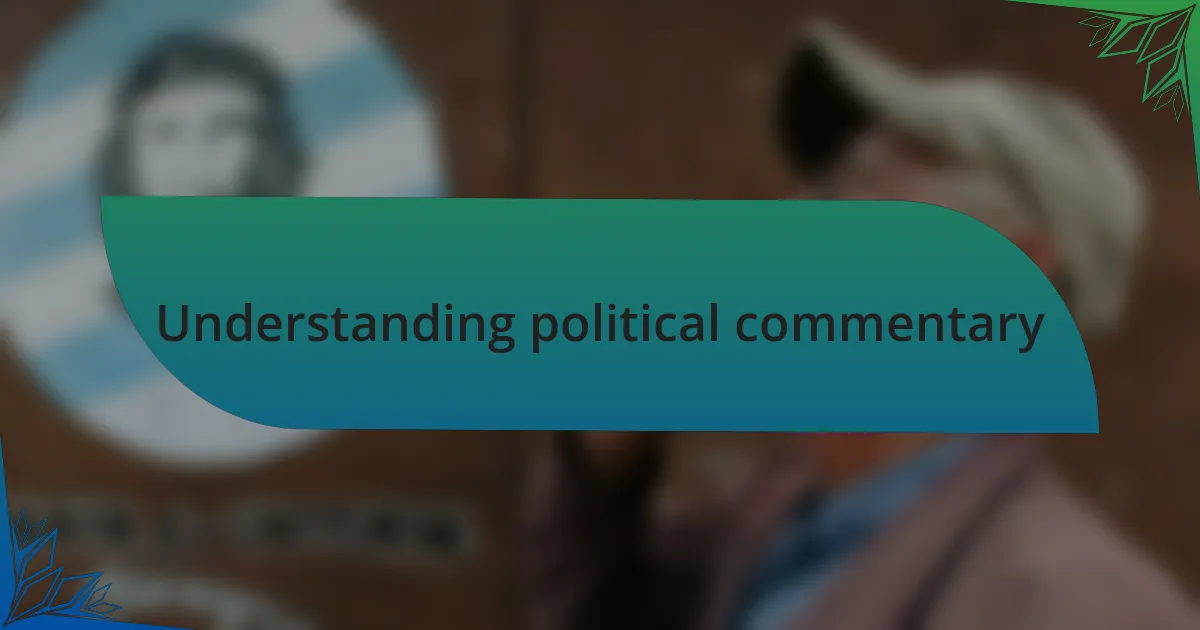
Understanding political commentary
Political commentary is more than just expressing opinions; it’s about analyzing events, ideologies, and policies that shape our society. I remember the first time I really grasped the power of commentary during a heated election cycle. I found myself glued to debates, not just for the spectacle but for the insights that commentators offered on the underlying implications of each candidate’s platform.
Engaging with political commentary often feels like entering a conversation that never truly ends. Have you ever felt overwhelmed by the constant stream of news? I have, and that’s where commentary becomes invaluable. It’s a lens through which we can dissect complex issues and find meaning in the chaos of political discourse, helping us to understand not only what’s happening but why it matters.
Moreover, the emotional aspect of political commentary can’t be overlooked. I’ve encountered pieces that stirred such strong feelings within me—rage, hope, even despair. It’s this blend of emotion and intellect that fuels a rich dialogue about our governance and society, pushing us to think critically and form our own opinions rather than passively consuming information.
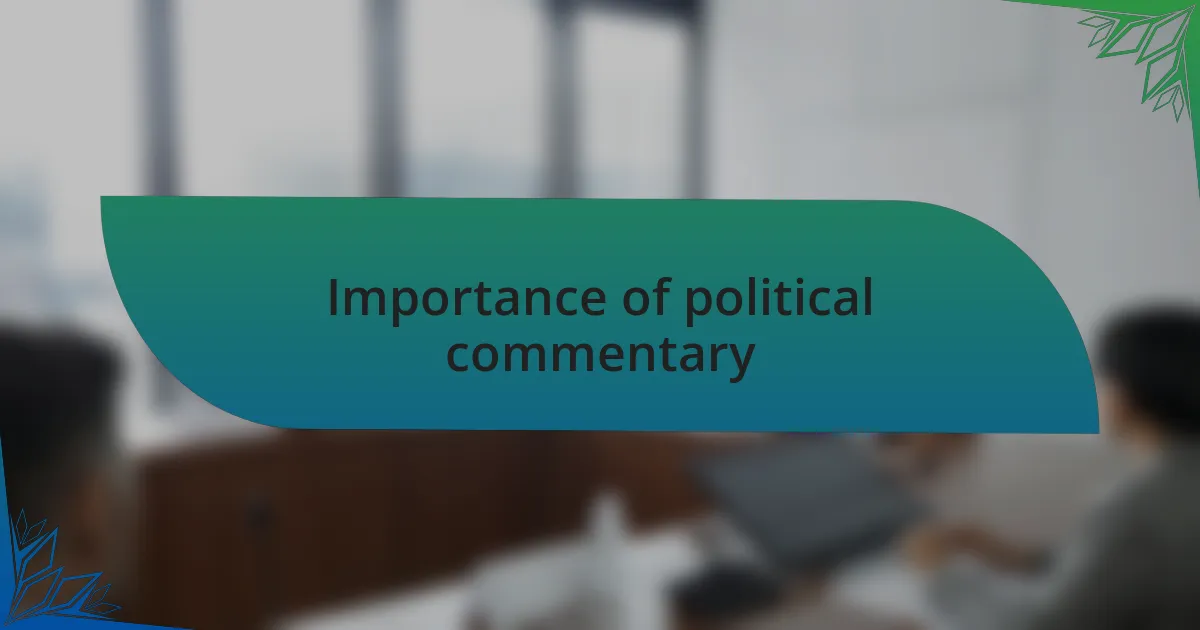
Importance of political commentary
Political commentary plays a crucial role in shaping public understanding and engagement. I vividly recall a moment during a national crisis when a well-articulated commentary provided clarity amid confusion. It made me realize how vital it is for people to have access to analyses that not only break down events but also connect them to broader societal trends and historical contexts.
Each piece of commentary serves as a thread in the larger tapestry of public discourse. Have you ever read something that made you view an issue from a completely different angle? I certainly have. Those moments of enlightenment underscore how commentary fosters a well-rounded perspective, enabling us to explore dimensions of a topic that might otherwise remain obscured.
The power of commentary often lies in its ability to provoke thought and inspire action. I remember feeling driven to participate in a local rally after reading a passionate piece that laid bare the implications of a political decision on my community. Isn’t it fascinating how just a few well-chosen words can mobilize hearts and minds toward a common cause? The potential for influence is immense, reminding us that political commentary is not just a reflection of public sentiment but a catalyst for change.
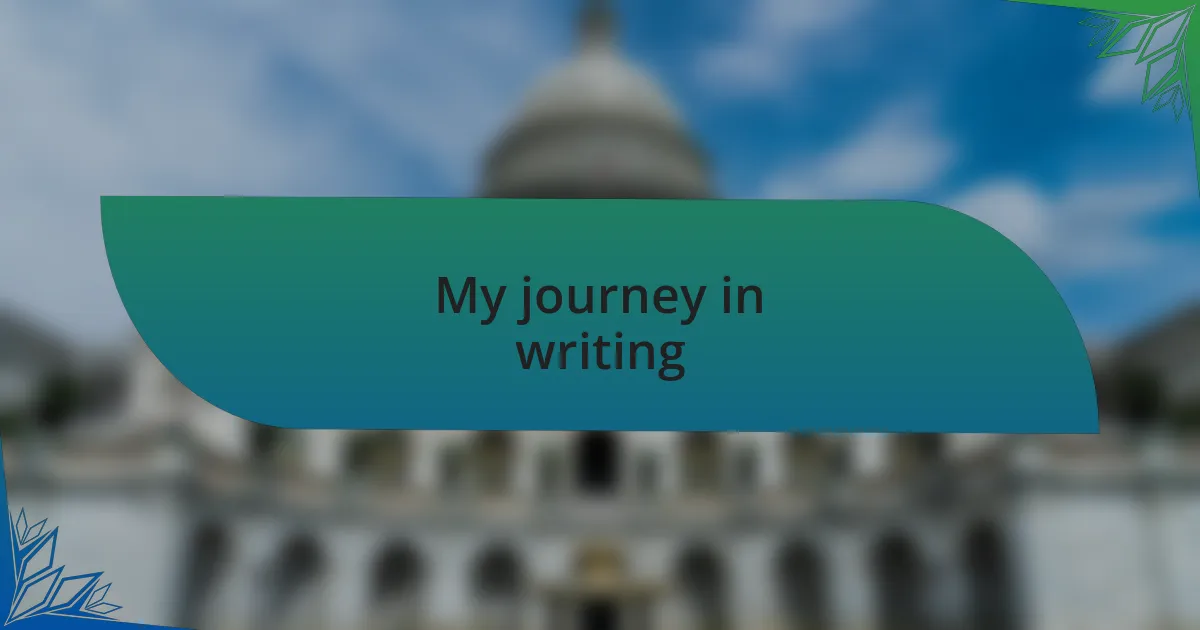
My journey in writing
My journey in writing began in my teenage years, sparked by a deep curiosity about the world around me. I vividly recall the first time I penned my thoughts on a controversial political topic for a school paper. The thrill of articulating my opinions, backed by research, ignited a passion that would only grow stronger over time.
As I continued to write, I found my voice through countless hours spent reading political analyses and opinion pieces. It was an exhilarating experience to dissect arguments and weave my unique perspective into the conversation. I still remember the rush I felt when a local magazine published my first opinion piece. It wasn’t just about seeing my name in print; it was a validation of my belief that my thoughts had the power to contribute to important discussions.
Every article I write is a small step in a larger journey. I’ve faced challenges, from writer’s block to criticism, but these moments have only deepened my commitment. When I receive feedback that my commentary helped someone think differently about a political issue, it reinforces my passion. Isn’t it remarkable how the written word can connect people and inspire change?
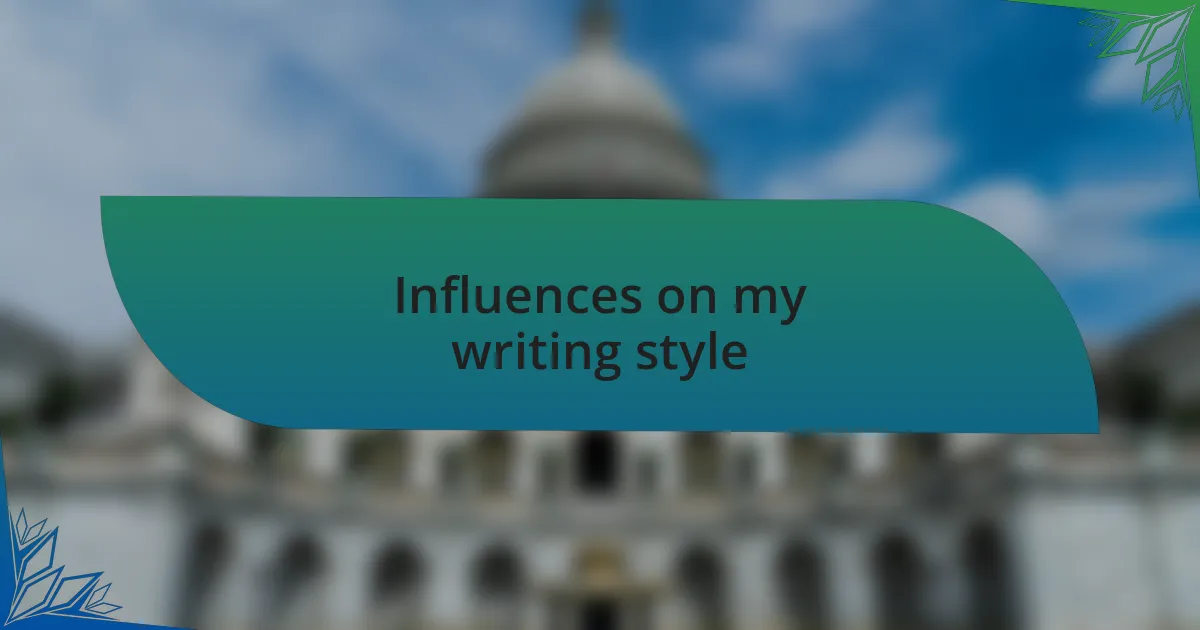
Influences on my writing style
The influences on my writing style are deeply rooted in my experiences and the writers I admire. I often find myself inspired by the works of political commentators whose eloquence and clarity resonate with my own beliefs. For instance, reading George Orwell’s essays opened my eyes to the power of straightforward language in tackling complex ideas. His ability to expose societal truths motivates me to always seek clarity in my writing.
Conversations with friends and fellow writers also shape my style. Engaging in debates over coffee has not only refined my arguments but has also taught me the importance of empathy in political discourse. I recall an intense discussion where my friend challenged my views, prompting me to articulate my thoughts more precisely. It was a pivotal moment that reminded me how critical dialogue enhances the depth of my writing.
Additionally, my background in journalism plays a significant role in my approach. The discipline of fact-checking and research has instilled in me a rigorous approach to writing, allowing me to balance passion with substance. I often reflect on my early days as a writer, where I nervously submitted pieces, fearing that raw emotion might overshadow a well-reasoned argument. Over time, I’ve learned to embrace my passion while ensuring that every statement is supported by credible evidence, creating a style rich in conviction and insight.
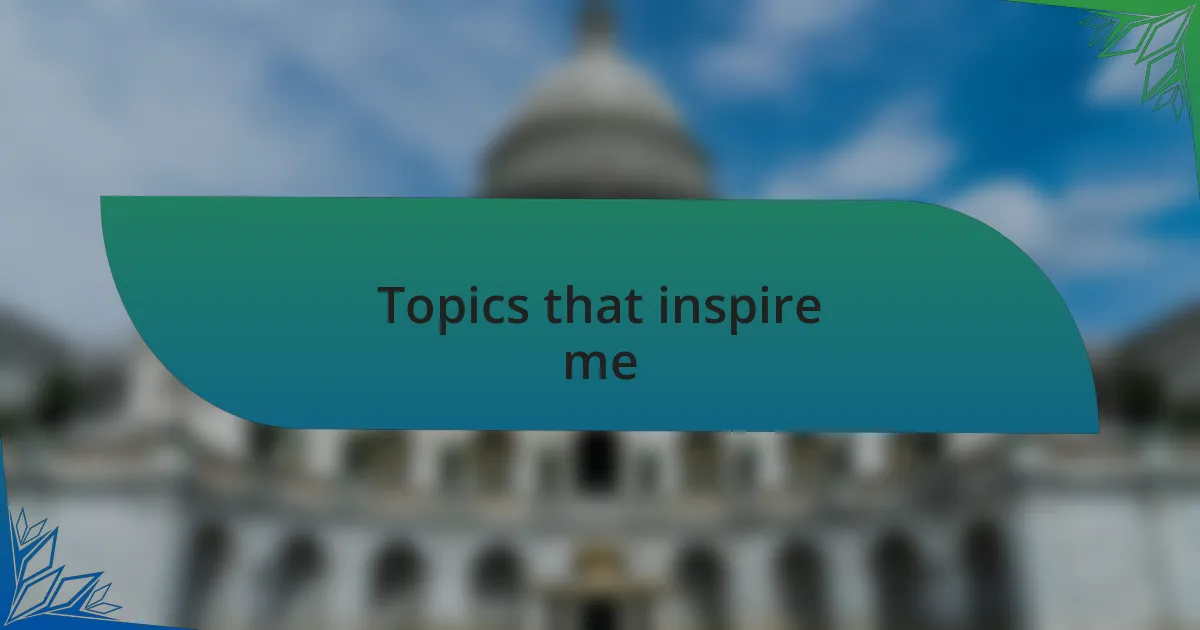
Topics that inspire me
When I think about the topics that inspire me, the injustice in our political systems often stirs my passion. I vividly remember attending a rally where passionate voices demanded change. Witnessing the raw energy and hope in the crowd made me realize how crucial it is for me to lend my voice to the discourse. Have you ever felt so moved by a single moment that it ignited a fire within you?
Another area that fuels my writing is the intricate dynamics of social movements. I find it fascinating how collective actions can reshape societal norms. It reminds me of a time I wrote about grassroots organizations working tirelessly to advocate for marginalized communities. Their stories pushed me to explore the human element behind statistics, making the issues more relatable and urgent. Writing these narratives solidified my belief that every individual’s story contributes to the broader narrative of justice.
Lastly, I’m increasingly inspired by the intersection of technology and politics. Observing how social media can amplify voices or stifle dissent intrigues me. I recall scrolling through Twitter during a major political event, noticing how real-time commentary shaped public opinion. This experience highlighted the responsibility I feel as a writer to critically analyze how digital platforms influence our understanding of political realities. How do we navigate this ever-changing landscape? It’s a question I continuously ponder as I craft my pieces.
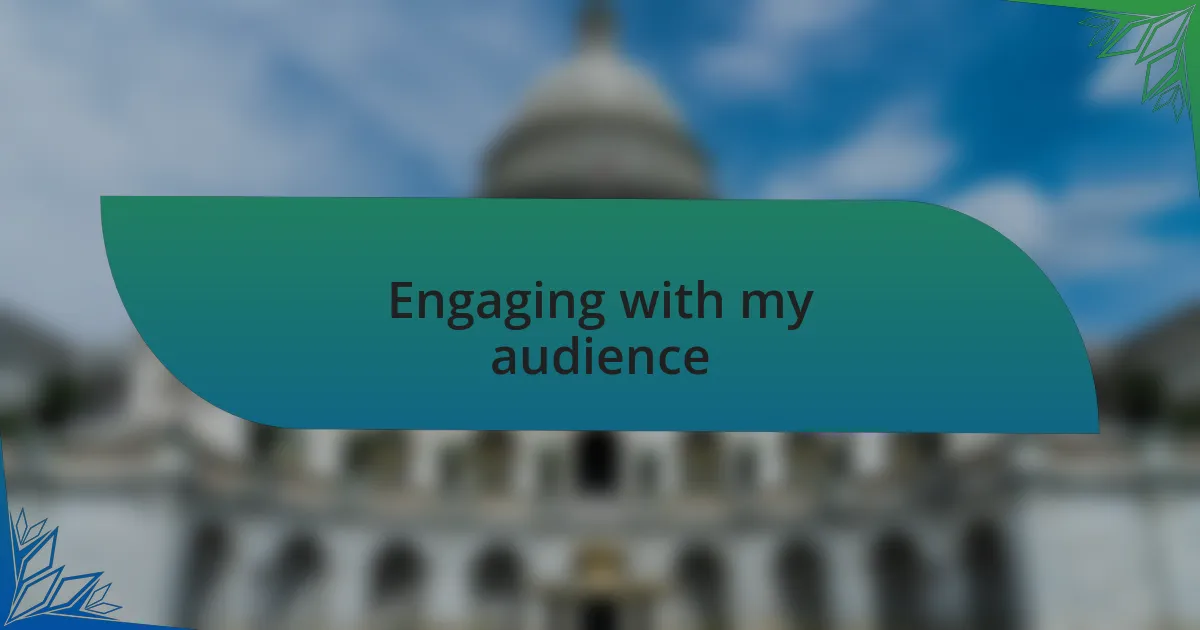
Engaging with my audience
Engaging with my audience goes beyond merely presenting information; it’s about creating a dialogue that resonates with them. I remember one comment on a blog post where a reader shared their own experiences with political apathy. Their honesty moved me, sparking a thread of conversation that revealed not just disillusionment but also a desire for change. Have you ever connected with someone over a shared struggle? That moment reminded me that our collective voices can fuel a movement.
I strive to make my content relatable and accessible. When I craft an article, I often think about the readers sitting at their kitchen tables or commuting on the train. I recall a discussion I had with a friend who felt overwhelmed by political jargon. It prompted me to simplify my language and incorporate real-world examples, empowering more people to engage in political discourse. Isn’t it empowering when complex issues become easier to understand?
Sometimes, I host live Q&A sessions after publishing major pieces. I cherish the immediacy of these interactions; the questions and reactions from my audience fuel my passion. One particular session had a reader asking about the nuances of grassroots movements, which inspired me to delve deeper into that topic in my next article. How often do we overlook the insights that emerge when we simply listen? It’s this give-and-take that enriches my writing journey and strengthens the bond with my audience.